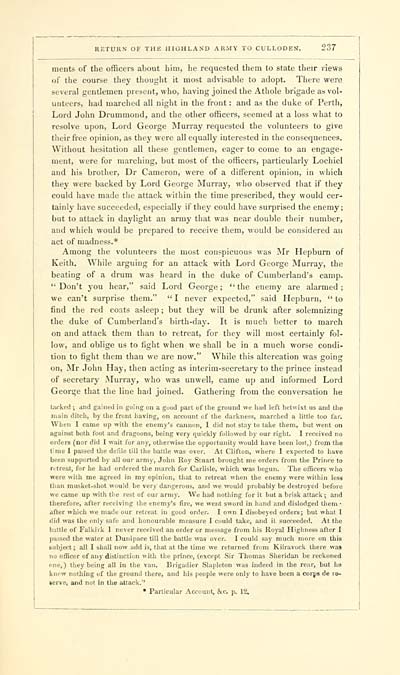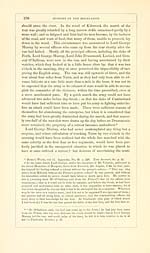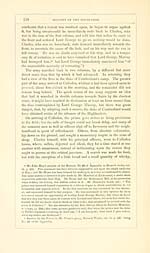Download files
Complete book:
Individual page:
Thumbnail gallery: Grid view | List view

RETURN OF THE HIGHLAND ARMY TO CULLODEN. 237
ments of the officers about him, he requested them to state tlieir views
of the course they thought it most advisable to adopt. There were
several gentlemen present, wlio, having joined the Athole brigade as vol-
unteers, had niarclied all night in the front : and as the duke of Perth,
Lord John Drummond, and the other officers, seemed at a loss what to
resolve u])on, Lord George Murray requested the volunteers to give
their free opinion, as they were all equally interested in the consequences.
Without hesitation all these gentlemen, eager to come to an engage-
ment, were for marching, but most of the officers, particularly Lochiel
and his brother, Dr Cameron, were of a different opinion, in which
they were backed by Lord George Murray, who observed that if they
could have made the attack within the time prescribed, they would cer-
taiidy have succeeded, especially if they could have surprised the enemy;
but to attack in daj'light an army that was near double their number,
and which would be prepared to receive them, would be considered an
act of madness.*
Among the volunteers the most conspicuous was Mr Hepburn of
Keith. While arguing for an attack with Lord George Murray, the
beating of a drum was heard in the duke of Cumberland's camp.
" Don't you hear," said Lord George ; " the enemy are alarmed ;
we can't surprise them." " I never expected," said Hepburn, " to
find the red coats asleep ; but they will be drunk after solemnizing
the duke of Cumberland's birth-day. It is much better to march
on and attack them than to retreat, for they will most certainly fol-
low, and oblige us to fight when we shall be in a much worse condi-
tion to fight them than we are now." While this altercation was going
on, Mr John Hay, then acting as interim-secretary to the prince instead
of secretary Murray, who was unwell, came up and informed Lord
George that the line had joined. Gathering from the conversation he
tac^ied ; and gained in going on a good part of llie ground we liad left betwixt us and the
main ditch, by the front liaving, on account of the darliness, marched a little too far.
When I came up with the enemy's cannon, I did not stay to take them, but went on
against botii foot and dragoons, being very quickly followed by our right. I received no
orders (nor did I wait for any, otherwise the opportunity would have been lost,) from the
lime I passed tlie defile till ihe battle was over. At Clifton, where 1 expected to have
been supported by all our army, John Roy Stuart brought me orders from the Prince to
rrtreal, for he had ordered the march for Carlisle, which was begun. The officers who
were with me agreed in my opinion, that to retreat when the enemy were within less
than musket-shot would be very datigerous, and we would probably be destroyed before
we came up with the rest of our army. We had nothing for it but a brisk attack; and
therefore, after receiving the enemy's fire, we went sword in hand and dislodged them •
after which we made our retreat in good order. I own I disobeyed orders; but what I
did was the only safe and honourable measure 1 could take, and it succeeded. At the
battle of Falkirk 1 never received an order or message from his Royal Highness after I
passed the water at Dunipace till the battle was over. 1 could say much more on this
Bubject ; all I shall now add is, that at the time we returned from Kiiravock tlxere was
no officer of any distinction with the prince, (except Sir Thomas Sheridan be reckoned
one,) they being all in the van. Brigadier Slapleton was indeed in the rear, but lie
knew nothing of the ground there, and his people were only to have been a corps de re-
lerve, and not in the attack.''
• Particular Account, &c. p. 12.
ments of the officers about him, he requested them to state tlieir views
of the course they thought it most advisable to adopt. There were
several gentlemen present, wlio, having joined the Athole brigade as vol-
unteers, had niarclied all night in the front : and as the duke of Perth,
Lord John Drummond, and the other officers, seemed at a loss what to
resolve u])on, Lord George Murray requested the volunteers to give
their free opinion, as they were all equally interested in the consequences.
Without hesitation all these gentlemen, eager to come to an engage-
ment, were for marching, but most of the officers, particularly Lochiel
and his brother, Dr Cameron, were of a different opinion, in which
they were backed by Lord George Murray, who observed that if they
could have made the attack within the time prescribed, they would cer-
taiidy have succeeded, especially if they could have surprised the enemy;
but to attack in daj'light an army that was near double their number,
and which would be prepared to receive them, would be considered an
act of madness.*
Among the volunteers the most conspicuous was Mr Hepburn of
Keith. While arguing for an attack with Lord George Murray, the
beating of a drum was heard in the duke of Cumberland's camp.
" Don't you hear," said Lord George ; " the enemy are alarmed ;
we can't surprise them." " I never expected," said Hepburn, " to
find the red coats asleep ; but they will be drunk after solemnizing
the duke of Cumberland's birth-day. It is much better to march
on and attack them than to retreat, for they will most certainly fol-
low, and oblige us to fight when we shall be in a much worse condi-
tion to fight them than we are now." While this altercation was going
on, Mr John Hay, then acting as interim-secretary to the prince instead
of secretary Murray, who was unwell, came up and informed Lord
George that the line had joined. Gathering from the conversation he
tac^ied ; and gained in going on a good part of llie ground we liad left betwixt us and the
main ditch, by the front liaving, on account of the darliness, marched a little too far.
When I came up with the enemy's cannon, I did not stay to take them, but went on
against botii foot and dragoons, being very quickly followed by our right. I received no
orders (nor did I wait for any, otherwise the opportunity would have been lost,) from the
lime I passed tlie defile till ihe battle was over. At Clifton, where 1 expected to have
been supported by all our army, John Roy Stuart brought me orders from the Prince to
rrtreal, for he had ordered the march for Carlisle, which was begun. The officers who
were with me agreed in my opinion, that to retreat when the enemy were within less
than musket-shot would be very datigerous, and we would probably be destroyed before
we came up with the rest of our army. We had nothing for it but a brisk attack; and
therefore, after receiving the enemy's fire, we went sword in hand and dislodged them •
after which we made our retreat in good order. I own I disobeyed orders; but what I
did was the only safe and honourable measure 1 could take, and it succeeded. At the
battle of Falkirk 1 never received an order or message from his Royal Highness after I
passed the water at Dunipace till the battle was over. 1 could say much more on this
Bubject ; all I shall now add is, that at the time we returned from Kiiravock tlxere was
no officer of any distinction with the prince, (except Sir Thomas Sheridan be reckoned
one,) they being all in the van. Brigadier Slapleton was indeed in the rear, but lie
knew nothing of the ground there, and his people were only to have been a corps de re-
lerve, and not in the attack.''
• Particular Account, &c. p. 12.
Set display mode to: Large image | Transcription
Images and transcriptions on this page, including medium image downloads, may be used under the Creative Commons Attribution 4.0 International Licence unless otherwise stated. ![]()
| Early Gaelic Book Collections > Ossian Collection > History of the Highlands and of the Highland clans > Volume 3 > (271) |
|---|
| Permanent URL | https://digital.nls.uk/79655674 |
|---|
| Description | Vol. III. |
|---|---|
| Shelfmark | Oss.249 |
| Attribution and copyright: |
|
| Description | Selected books from the Ossian Collection of 327 volumes, originally assembled by J. Norman Methven of Perth. Different editions and translations of James MacPherson's epic poem 'Ossian', some with a map of the 'Kingdom of Connor'. Also secondary material relating to Ossianic poetry and the Ossian controversy. |
|---|
| Description | Selected items from five 'Special and Named Printed Collections'. Includes books in Gaelic and other Celtic languages, works about the Gaels, their languages, literature, culture and history. |
|---|

